The Vision for a SuSol Education Center
By Sustainable Solano
Sustainable Solano has had a vision for a while now: To have an office space that serves as a place of education around the many things we teach about, such as sustainable landscaping, water capture and reuse; cooking with seasonal, sustainable local food; and building community resilience.
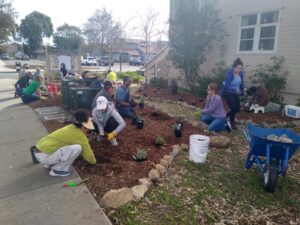 We have been lucky to spend the past few years in our office at the Global Center for Success on Mare Island. This office space puts us near nonprofit partner organizations and the beauty of the Vallejo People’s Garden and the Pollinator Pathway garden we installed with them and Solano RCD in front of the building. But as our team has grown in number, we find there are limitations in a one-room office, both for our team members’ needs as well as ways we would like to interact with all of you in the community.
We have been lucky to spend the past few years in our office at the Global Center for Success on Mare Island. This office space puts us near nonprofit partner organizations and the beauty of the Vallejo People’s Garden and the Pollinator Pathway garden we installed with them and Solano RCD in front of the building. But as our team has grown in number, we find there are limitations in a one-room office, both for our team members’ needs as well as ways we would like to interact with all of you in the community.
And so we are returning to that original vision.
We would love to find a safe and beautiful place where we can create and exhibit the solutions we’ve been teaching and demonstrating for nearly 25 years. These may include a permaculture garden or farm, sustainable water techniques, solar energy and maybe even chickens. There could be a commercial kitchen space for teaching classes and preparing food (or the potential to add such a space). We also need a shared workspace and a place to gather around a table for large team or partner meetings, and an area to house tools and equipment, promotional materials and office files. The property would need to be zoned to allow for office space and would need to be able to support visitors coming to the site for meetings, classes and demonstrations.
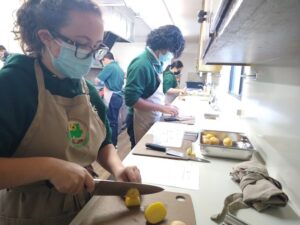 We’ve seen creative and innovative ways individuals, organizations and cities have supported such projects. In Berkeley, the Ecology Center runs EcoHouse, which was founded in 1999 when a group of individuals “collectively purchased and transformed a small, dilapidated North Berkeley home into a demonstration house and garden.” In American Canyon, the city offered up an old public works yard to be transformed into the Napa River Ecology Center in partnership with the American Canyon Community Parks Foundation. Santa Cruz Permaculture now stewards a 26-acre farm under a 30-year lease as part of its operations.
We’ve seen creative and innovative ways individuals, organizations and cities have supported such projects. In Berkeley, the Ecology Center runs EcoHouse, which was founded in 1999 when a group of individuals “collectively purchased and transformed a small, dilapidated North Berkeley home into a demonstration house and garden.” In American Canyon, the city offered up an old public works yard to be transformed into the Napa River Ecology Center in partnership with the American Canyon Community Parks Foundation. Santa Cruz Permaculture now stewards a 26-acre farm under a 30-year lease as part of its operations.
We’d love to hear your ideas and suggestions for supporting this vision! Reach out to us at info@sustainablesolano.org
Even with this active vision for an education center, Sustainable Solano is committed to continuing hands-on sustainable landscaping and resilience-building workshops, cooking classes, and internships within Solano communities, because these are the very heart of our work. Our goal is to bring neighbors together in ways that help them connect with each other, the Earth, and themselves.

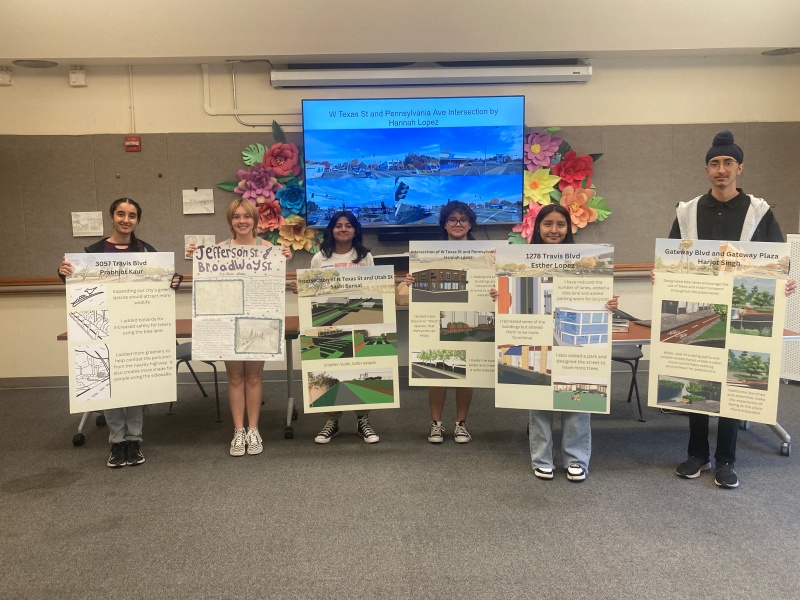

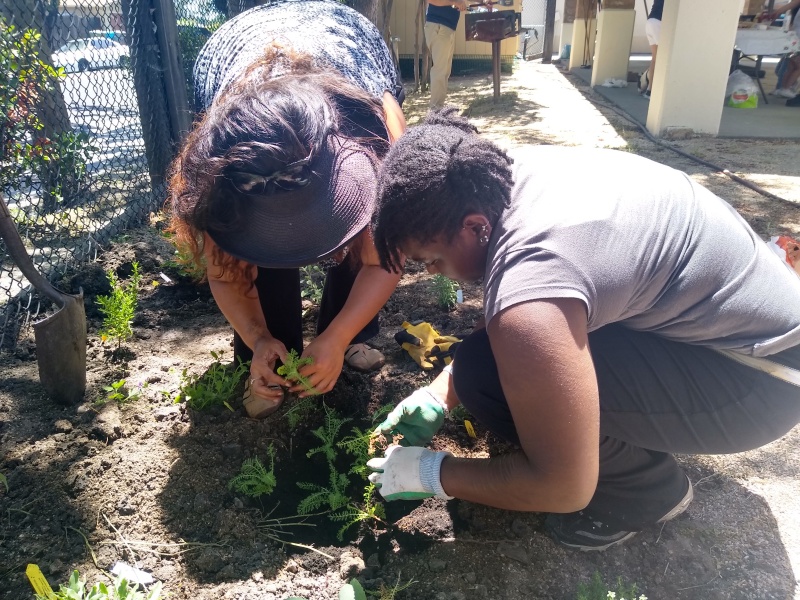
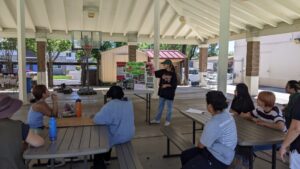 Each student then delivered public presentations at various locations around Vacaville, including the Rocky Hill Trail, the Town Square library, and an Earth Day event in Andrews Park. The culmination of their efforts was the installation of a much-anticipated pollinator garden at the Vacaville Boys and Girls Club, where the students also presented their research findings. Situated right in the heart of the Markham neighborhood, the local community had been seeking a native pollinator garden since 2018.
Each student then delivered public presentations at various locations around Vacaville, including the Rocky Hill Trail, the Town Square library, and an Earth Day event in Andrews Park. The culmination of their efforts was the installation of a much-anticipated pollinator garden at the Vacaville Boys and Girls Club, where the students also presented their research findings. Situated right in the heart of the Markham neighborhood, the local community had been seeking a native pollinator garden since 2018.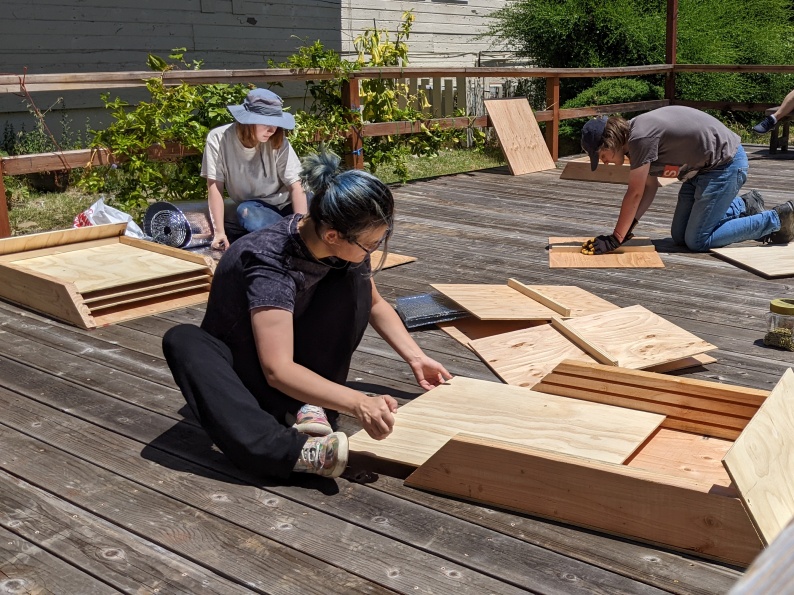
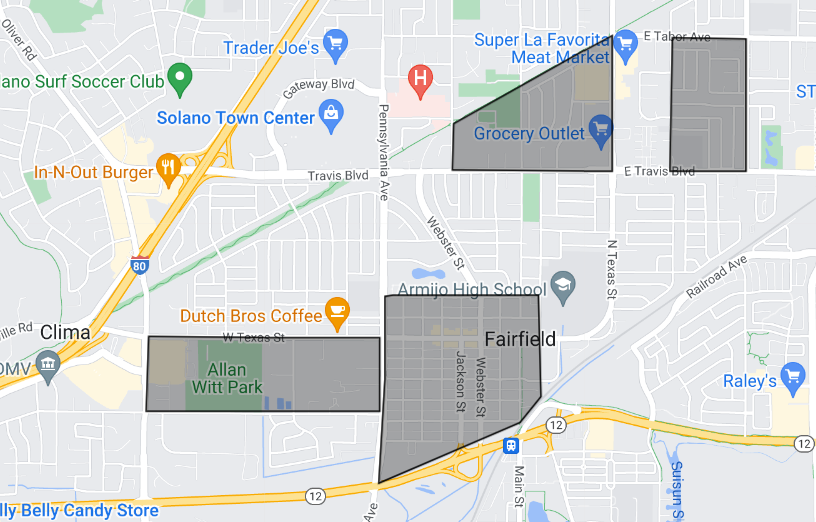
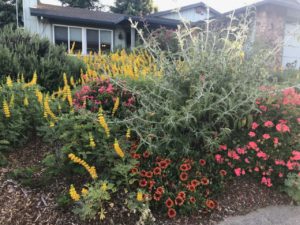 Mature front yard food forest has mostly fruit trees and native plants that attract pollinators year-round. It has a laundry-to-landscape greywater system.
Mature front yard food forest has mostly fruit trees and native plants that attract pollinators year-round. It has a laundry-to-landscape greywater system.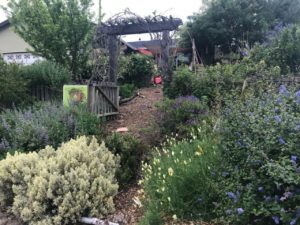 An 8-year-old established food forest with two swales that are dug out and refreshed every 2-3 years, laundry-to-landscape greywater to fruit trees, and chickens. The drip irrigation system was removed three years ago and the garden is thriving! Annual beds are hand-watered once a week during the growing season. Greyhawk Grove is a “high-traffic-survival-of-the-fittest-have-three-young-children garden”. There may be lemonade and baked goods for sale by children, as well as products from the garden to give away (dried calendula, lavender, herbs, eggs, fruit, etc.).
An 8-year-old established food forest with two swales that are dug out and refreshed every 2-3 years, laundry-to-landscape greywater to fruit trees, and chickens. The drip irrigation system was removed three years ago and the garden is thriving! Annual beds are hand-watered once a week during the growing season. Greyhawk Grove is a “high-traffic-survival-of-the-fittest-have-three-young-children garden”. There may be lemonade and baked goods for sale by children, as well as products from the garden to give away (dried calendula, lavender, herbs, eggs, fruit, etc.).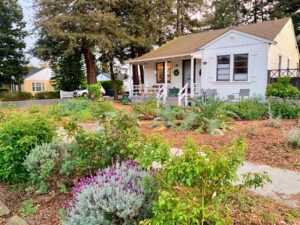 Food forest garden and greywater system installed as part of Sustainable Solano’s 2021
Food forest garden and greywater system installed as part of Sustainable Solano’s 2021 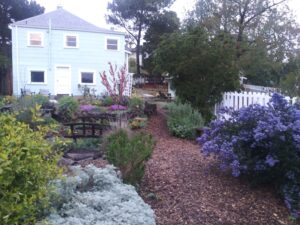 Southern slope food forest focused on pollinators, shrubs and native plants. It also includes fruit trees, perennial and edible plants, swales and a laundry-to-landscape greywater system.
Southern slope food forest focused on pollinators, shrubs and native plants. It also includes fruit trees, perennial and edible plants, swales and a laundry-to-landscape greywater system.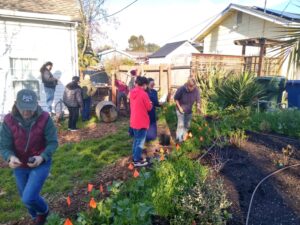 A new and evolving food forest garden and greywater system installed as part of Sustainable Solano’s 2022-23
A new and evolving food forest garden and greywater system installed as part of Sustainable Solano’s 2022-23 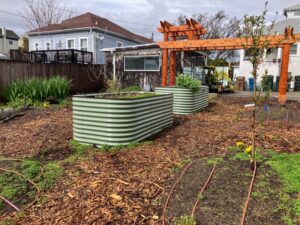 This homeowner attended our tours and was inspired to transform his yard! This brand new garden, designed by Michael Wedgley, is a unique opportunity to tour a stunning and sustainable backyard that showcases the beauty and abundance of permaculture. This eco-conscious backyard features a rainwater catchment system that can harvest up to 3,500 gallons per year, helping to restore the on-site water table, and providing an abundant source of water for this permaculture food forest.
This homeowner attended our tours and was inspired to transform his yard! This brand new garden, designed by Michael Wedgley, is a unique opportunity to tour a stunning and sustainable backyard that showcases the beauty and abundance of permaculture. This eco-conscious backyard features a rainwater catchment system that can harvest up to 3,500 gallons per year, helping to restore the on-site water table, and providing an abundant source of water for this permaculture food forest.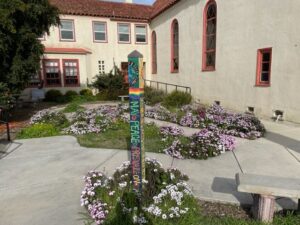 Two separate gardens, one is a peace garden with mostly flowers, cactus and trees and the other is the vegetable garden, called Johnson Ranch. The vegetable garden was revived through the
Two separate gardens, one is a peace garden with mostly flowers, cactus and trees and the other is the vegetable garden, called Johnson Ranch. The vegetable garden was revived through the 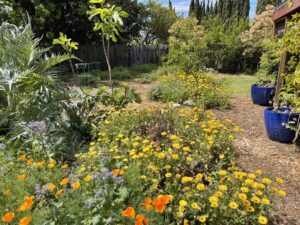 Morningside Botanical Bounty food forest was created as part of the
Morningside Botanical Bounty food forest was created as part of the 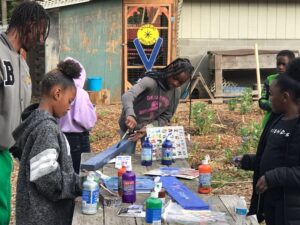 Vallejo Project’s Unity Garden initiative restored an abandoned lot that was once filled with sand and garbage and turned it into a multi-level food forest with internationally influenced farming techniques and 10 chickens. This garden is focused on urban agriculture.
Vallejo Project’s Unity Garden initiative restored an abandoned lot that was once filled with sand and garbage and turned it into a multi-level food forest with internationally influenced farming techniques and 10 chickens. This garden is focused on urban agriculture.